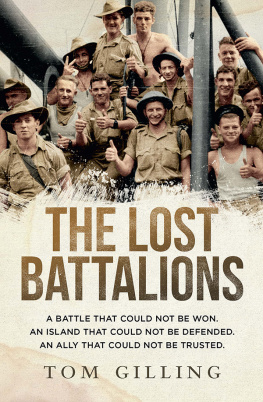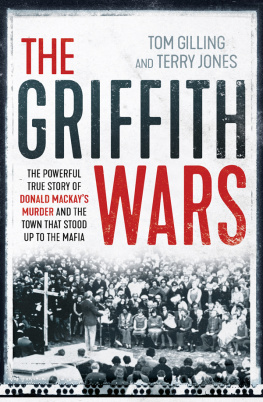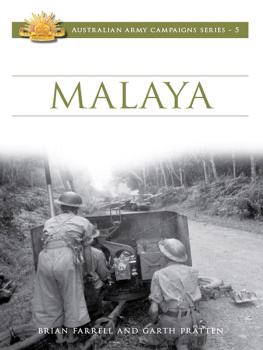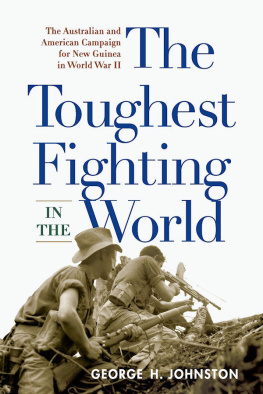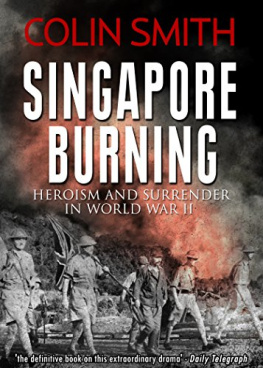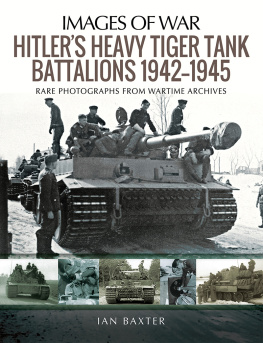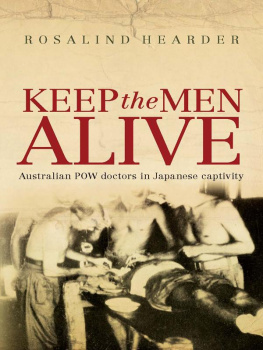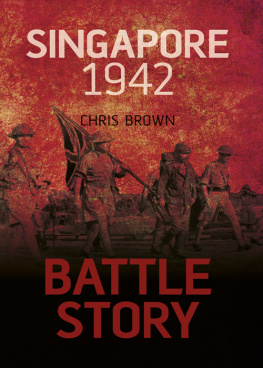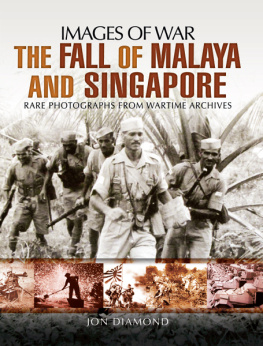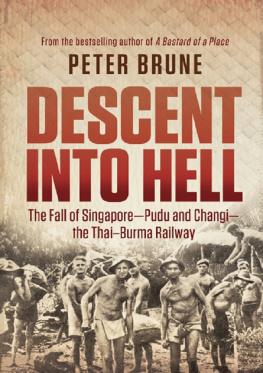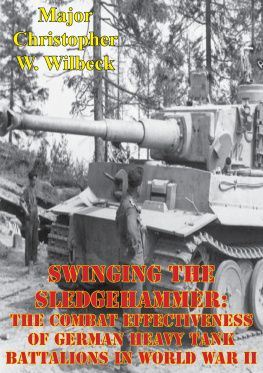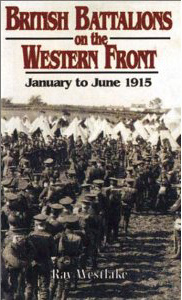First published in 2018
Copyright Tom Gilling 2018
All rights reserved. No part of this book may be reproduced or transmitted in any form or by any means, electronic or mechanical, including photocopying, recording or by any information storage and retrieval system, without prior permission in writing from the publisher. The Australian Copyright Act 1968 (the Act) allows a maximum of one chapter or 10 per cent of this book, whichever is the greater, to be photocopied by any educational institution for its educational purposes provided that the educational institution (or body that administers it) has given a remuneration notice to the Copyright Agency (Australia) under the Act.
Allen & Unwin
83 Alexander Street
Crows Nest NSW 2065
Australia
Phone: (61 2) 8425 0100
Email:
Web: www.allenandunwin.com

ISBN 978 1 76063 234 2
eISBN 978 1 76063 708 8
Set by Midland Typesetters, Australia
Cover design: Luke Causby / Blue Cork
Cover image: Australian War Memorial image number O11779/04
For Aidan
CONTENTS


There is significant variation in the spelling of place names in the former Netherlands East Indies, Burma and Siam. Where countries, cities and towns have been renamed since the war (e.g., Batavia is now Jakarta), I have generally used the wartime name rather than its modern equivalent.
Keeping Fit in the Tropics
Follow these simple rules to avoid tropical diseases. Tropical malaria can be avoided by an intelligent soldier. Take atebrin tablets as ordered, after a meal, and followed by a drink of water. Always carry a supply of atebrin tablets, and if separated from your unit, take one every day. If you forget one day, take two the next day. Sleep under a mosquito net.
Always from dusk until dawn, unless sleeping under a net, wear slacks, gaiters and long sleeved shirt (sleeves rolled down) and apply repellent lotion to face and hands every 3 hours. Always carry a bottle of repellent lotion. Treat your clothes with Anti-Mite Fluid. Follow the directions for its use exactly and avoid Scrub Typhus. To avoid dysentery and typhoid do not drink water unless it has been boiled or chlorinated. Keep flies and other insects off your food and keep eating utensils clean. Wash your body as much and as often as possible, to avoid tropical skin diseases. Carry your own soap always. Carry an extra pair of socks and underwear. Wear the socks on alternate days.
Australian Military Forces Record of Service Book, revised August 1944

On Good Friday, 11 April 1941, nine hundred officers and men of the 2/3rd Machine Gun Battalion steamed out of Sydney Harbour aboard the military transport ship MM, destination unknown. The MMa monster, in the words of Alf Sheppard of B Company, larger than any ship any of us had ever seen beforewas painted grey, but its drab exterior could not disguise the fact that it was the luxury ocean liner Ile de France, which had been commandeered by Britain after the fall of France. In total it carried more than 4000 soldiers.
Accompanying the Ile de France out of Sydney Harbour were three more requisitioned ocean liners, Queen Elizabeth, Mauretania and the Dutch Nieuw Amsterdam. The Queen Mary was waiting for them at Jervis Bay, 170 kilometres down the New South Wales coast, with the soldiers of the 2/2nd Pioneer Battalion, a newly formed unit like the machine gunners. (A few of the Pioneers had been squeezed aboard the Queen Elizabeth.)
Between them the five converted liners carried 25,000 soldiersthe largest Australian military force to be sent overseas since the First Australian Imperial Force in 1914. Private Desmond Jackson, who had joined the machine gunners at the age of 20, described the convoy as a fleet of giants.
Raised in South Australia, Victoria, Tasmania and Western Australia, the machine gun battalion was led by an Adelaide lawyer, Lieutenant Colonel Arthur Seaforth Blackburn. Nearly a quarter of a century earlier, Blackburn had been awarded the Victoria Cross by King George V at Buckingham Palace for his bravery in France, where he led repeated attacks on German strongpoints outside the village of Pozires. Reports of Blackburns extraordinary exploits on the Western Front appeared in newspapers big and small all over Australia. In a letter published in October 1916 by the Richmond River Express and Casino Kyogle Advertiser (and reprinted in many other papers), Blackburn recalled the fearful scrap at Pozires, where he and his men
fought solidly for three days and nights, almost without stopping, and drove our way foot by foot through the village Goodness only knows how I got out of it alive, as 17 times the man behind me was killed, and 22 men behind me were wounded While working my way up the trench, I came upon a lad of 19 chained by the hand and waist to a machine gun. Fancy having to chain your men to guns. No wonder the beggars are hard to drive out, as they are all quite convinced that we take no prisoners and will kill them all.
At the age of 49, Blackburn was determined to prove to his newly formed machine gun battalion that he was not past it. In forced marches, the skinny-legged colonel always led from the front, astonishing men young enough to be his sons with his physical stamina and sheer bloody-mindedness.
As well as being an experienced and resourceful soldier, Blackburn was a skilled organisera talent that would prove indispensable to the troops aboard the trouble-prone Ile de France. Veterans described sewerage problems, a shortage of drinking water and a diet consisting almost exclusively of boiled potatoes and porridge. After about a week on these rations we were almost on the verge of mutiny, Private Tom Keays recalled in the 2/3rd Machine Gun Battalion history, From Snow to Jungle. After Blackburn took over domestic arrangements, the cooks were hastily replaced by our own army cooks and the meals were much more palatable thereafter.
To Des Jackson it was an uneventful voyage, but danger was rarely far away. Fear of attack by German raiders meant that a total blackout applied to ships off the New South Wales coast. Escorted by a warship, the heavy cruiser HMAS Australia, the converted liners carried little in the way of armament. Eight of the battalions Vickers machine guns were manned round the clock to protect the Ile de France from attack by enemy aircrafta popular duty, one soldier remembered, as it meant escaping from the darkness and suffocating heat below deck. Life jackets and full water bottles had to be carried at all times, and there were regular emergency drills.
After picking up the Queen Mary off Jervis Bay, the convoy steamed south. Although many of the Queen Marys interior fittings had been stripped out when she was converted to a troop ship, the men of the 2/2nd Pioneer Battalion were surprised to discover her luxurious accommodation largely intact. Corporal Harry Walker, the middle child of eleven from Alma, in Victoria, was impressed with the size of the ship but would suffer along with his mates as the ship neared the equator. It was designed for the cold Atlantic Ocean run, Walker said in his tape-recorded memoirs. There wasnt sufficient air conditioning for the tropics, and boy did we swelter.

